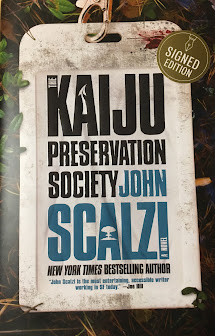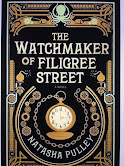My Own Personal Reset; a Look at John Scalzi's The Kaiju Preservation Society by Theresa Gauthier
The Kaiju Preservation Society is a book I will always hold in high regard because it’s the title that seems to have banished whatever funk has enveloped me since 2020 and robbed me of my joy of reading. I was starting to worry I might never be able to focus on a good book again.
My To Be Read Stack of Books is huge, so I had no shortage of possibilities. I had the time to read, but I seemed unable even to pick up any of them. It just seemed like far too much trouble. My selected book would sit there on a table as my desire to read warred with my disinterest in doing anything. If I did manage to crack open a novel, I’d be distracted. I’d think of a thousand other things I should be doing rather than sitting down and reading my book.
Enter The Kaiju Preservation Society.
I’d heard about it months earlier—I follow John Scalzi on social media, and I follow Wil Wheaton as well. Wheaton posted that he was reading the book for the audiobook edition, and was so taken with the story that he couldn’t stop grinning. I have to admit, once I started reading it, I understood what made him so giddy.
My mother surprised me this year for my birthday with a ticket to Scalzi's virtual Barnes & Noble book signing, in conversation with Monica Byrne (author of The Actual Star and The Girl in the Road). After the event, I received the signed copy of the book along with a Laptop Decal.
It’s a fun romp of a book, unlikely, yet at the same time feasible within the confines of the narrative. More thanthat—it was plausible, understandable, and joyful. I’ve heard comparison’s to Jurassic Park, for obvious reasons, but there are no real similarities. KJP is not a man-made park for housing dinosaurs. Instead, it’s a parallel world where Kaiju—a Japanese term for giant monsters or “Godzillas”—roam in their natural habitat. Humans, having learned of them, have set themselves up across the globe where the barriers between the worlds are thin to study the Kaiju and ostensibly to keep them safe—but I think, at least initially, there’s a lot more studying than preserving.
The protagonist, recruited after a bout of unemployment relieved only by a job delivering food in New York City in the early days of the pandemic, joins the scientific teams doing most of the grunt work—repeatedly telling people, “I lift things.” It’s almost as if she’s trying to keep people from thinking for a moment that she might be a scientist.
The newbies to the KPS (the protagonist isn't the only one) bond as they acclimate to the unique circumstances and embrace their new duties. The cast of characters is diverse, and their personalities are well-defined, unique, and best of all fun. I’d love to meet these people. Though given their scientific specialties, and my preference for science with a heavy dose of fiction, if I wanted to be there I’d have to lift things, too.
Speaking of science, there’s no shortage of it, but being an alternate world, it bears little resemblance to our own. The science behind the very existence of the Kaiju is mind-bending. Scalzi has mapped out not only an entire world, but also created unique biological responses to a series of unlikely developments. New discoveries push the scientists’ excitement to the limit, and eventually, when a threat develops endangering both Earths, the Kaiju Preservation Society has to decide how best to live up to their name.
This is a fun story—Scalzi likens it to a pop song. It’s full of characters I wouldn’t mind knowing, funny moments of dialogue, and bizarre situations that, as I said, are plausible in the context of the novel. Not only that, but the story itself is a triumph on so many levels. Forgetting for a moment the intricate world-building, the careful consideration of alternate science, and easy dialogue, I like these characters. They’re fun. I’d love to meet them and be friends with them—though I don’t think I’d be willing to do the job they do.
Scalzi hasn’t slammed the door on a sequel, though he has no current plans for one. I’m fine with that. If he writes a sequel, I’d be happy to read it. If he doesn’t, I’d be just as happy to reread this one.
The Kaiju Preservation Society and John Scalzi have earned a prominent place on my bookshelf and in my heart for reviving my love of reading.









Comments
Post a Comment